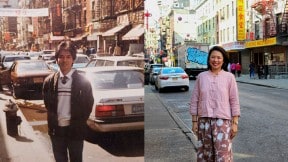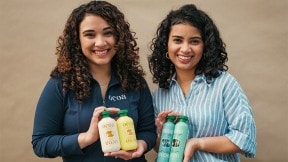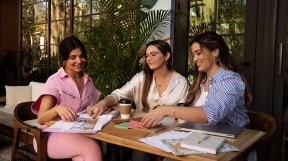Sustainability sells, no kidding
Little Seed Farm brings innovation to skincare and sustainability. Presented by Chase for Business.
Participants compensated
What do you do when you have a farm and 50 kids? Obviously, you make skincare products. That is, if nearly all of those kids are goats.
Since 2012, James and Eileen Ray have owned and operated Little Seed Farm, where they make eco-friendly goat’s milk soaps, lotions and other skincare products. Remaining true to their core values of quality and sustainability, they’ve carved out a niche in a crowded marketplace and found a dedicated customer base, too.
Taking the first step
Eileen and James met in New York, where they spent years climbing the corporate ladder. Eventually, they tired of the grind. “We achieved our childhood career goals and realized that we wanted to do something different with the rest of our lives,” Eileen says.
They weren’t sure exactly what that was, but they knew they wanted to be close to nature and start a business together. So they packed their things and moved to Lebanon, Tennessee.
“We wanted to create our own jobs and our own lifestyle in a natural setting, in a way that benefited the community around us and the Earth in general,” James says. “That led us to farming.”
Yes, uprooting their lives and going into business together was a risk. But a risk they don’t regret taking. “We wanted to build something that our kids and our grandkids would be proud of,” Eileen says.
Finding their footing
Most startups get a few steps in before they need to pivot. For the Rays, their first pivot came almost before they’d set foot on the farm. While they’d planned to raise cattle, they quickly discovered their land was a terrible fit for cows. It was, however, perfect for goats. Which was a bit concerning as they’d heard again and again that goats were impossible to work with.
They chose to embrace the goats. “We went with what the land presented us,” James says, “instead of trying to force our objectives on the land.”
Fortunately, the goats they brought to their farm were easy to love, if a bit rambunctious. “Each goat has their own personality,” Eileen says. “They’re so sweet.”
The Rays started making goat cheese for their local farmer’s market. Then Eileen received a fateful call from her grandmother: “Can we try making goat’s milk soap next time I visit?” They raided their kitchen for the necessary ingredients and gave it a go.
Next thing they knew, they were selling soap at the market too. It quickly became so popular that the Rays stopped making cheese and began devoting their time to skincare products. The rising demand soon inspired a website with an eCommerce portal.
A sustainable advantage
Skincare can be a tough market, and buyers tend to stick with names they know. To expand beyond their local market, the Rays needed to find a way to convince potential customers to try something new.
They decided to shine a spotlight on their sustainability. All Little Seed milk is ethically sourced from goats that spend their days happily grazing on the farm, and the Rays will tell you they’re one of the only 100% grass-fed goat dairies in the country.
“We make everything from scratch, start to finish,” says Eileen, who illustrates the product labels herself. “We even include a handwritten note.”
The Rays continue to spread the message about their sustainable farming, goats and products so that customers can see exactly how the products they love are made and how Little Seed Farm is run.
Scaling up, but staying true
As Little Seed grew from a two-person operation to a 14-member team, the bulk of sales shifted from in person to online. While they welcomed the additional orders, they worried about increasing their carbon footprint. To maintain their commitment to sustainability, the Rays needed a way to make product packing and shipping processes as eco-friendly as possible.
First, they started sourcing compostable packing peanuts made of sorghum from a nearby feed mill. Then they began using water-activated tape on their shipments. They also made the decision to work with package-free shops and give customers the option to have orders shipped with less packing materials.
Customers are invited to send back empty bottles for sterilization and reuse. “A section of our website is dedicated to refilled products,” James says. “When you send it back, you give it another life.”
A partner to grow with
For any new business, rapid expansion presents fresh challenges. Little Seed was growing so quickly that the company’s buying needs were outpacing the Rays’ credit line. “James was paying our credit card bills literally every other day,” Eileen says. “It was a constant struggle.”
When a local Chase representative connected with them and ultimately offered them a much-needed credit increase, the Rays were thrilled. “From an operating perspective,” James says, “that was huge for us.”
The Rays also appreciate how convenient and cost-effective it can be to use their credit card. “We use the Chase Ink Business Premier card, and we love it,” says James, adding that he and Eileen get 2% cash back on every purchase and 2.5% on purchases over $5,000. “It covers a lot of the fees that we have to pay in the day-to-day operation of our business.”
Around 80% of Little Seed sales now come from eCommerce. And as far as the Rays are concerned, Chase’s digital platform has been crucial to the success of their business. They use Chase Business® Online to track and manage all expenses, from farm tools to packaging and everything in between.
“As we’ve grown, Chase has been there for us,” James says.
Evolving naturally
The future for Little Seed looks to evolve as organically as its beginning.
“Right now,” James notes, “we make natural and organic products to take care of your skin, head to toe.” Fifteen soap varieties are currently available, along with 10 different deodorant scents. The Rays also offer a full facial-care line of cleansers, toners, serums and moisturizers. Body oils and butters. Hand- and baby-care products. Plus lip treatments, salves and balms.
“But our dream is that Little Seed will continue to be a positive role model for sustainability,” he says. “And that one day when they’re older, our kids — our children — will want to be involved so we can pass that legacy on to the next generation.”
Are you a business owner looking for a new banking relationship? Reach out to a Chase business banker to learn how Chase can help.



